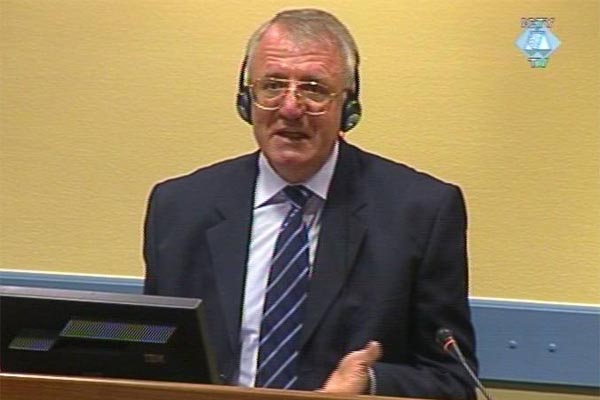Home
SESELJ’S BOOMERANG
Analyzing the findings of the amicus curiae who concluded after an in-depth investigation that there are no grounds for contempt of court proceedings against the former chief prosecutor and other prosecution staff, the prosecution now wants to have the amicus curiae report admitted into evidence at the main trial of the Serbian Radicals’ leader Vojislav Seselj. The prosecution contends that this would help assess the credibility of the witnesses who ‘changed their minds’ and withdrew their statements against the accused
 Vojislav Seselj in the courtroom
Vojislav Seselj in the courtroom The prosecution team in the Vojislav Seselj case submitted to the Trial Chamber its observations on the report of the special investigator amicus curiae who found there are no grounds for proceedings against former chief prosecutor Carla Del Ponte and a number of former and current prosecution staff on allegations that they pressured witnesses. In March 2007, the accused Seselj filed a motion stating that witnesses had been pressured in various ways into giving statements and evidence against him. This prompted Judge Antonetti’s Trial Chamber to appoint an independent investigator amicus curiae, whose identity has remained unknown. The redacted report of the amicus curiae was published in October 2011.
Seselj attached to his motion statements of witnesses who claimed they had been ‘deprived of sleep’, ‘blackmailed’ and ‘threatened’ in the course of their interviews with the prosecution. The witnesses also claimed that they were offered money, new identity and relocation to other countries. One witness maintained that he was offered the services of ‘young dancers’ at the expense of the Tribunal.
In its submission, the prosecution recalls that the amicus curiae thoroughly investigated the claims of 38 witnesses who accused the prosecution staff and specified in his report why their claims were inadmissible. First, parts of testimony or statements in which 11 witnesses spoke about the pressure exerted by the prosecution were either ‘false’ or ‘undermined’ by the claims the same witnesses made on other occasions. The report also says that the prosecution never interviewed six of the witnesses who had allegedly been blackmailed; five of them had never been contacted by the prosecution at all. Five witnesses were not able to identify the persons who had purportedly pressured them while 11 witnesses accused the prosecutions of acts that cannot be qualified as contempt of court.
The prosecution notes that Seselj publicly named the prosecution staff in his motion, thus impeaching their reputation. The prosecution therefore called on the judges to dismiss the ‘baseless” motion of the accused and to ‘immediately and unequivocally exonerate’ the prosecution staff named in the motion.
The prosecution also wants the amicus curiae report to be admitted into evidence in the main trial against Seselj on the indictment for crimes against non-Serbs in Croatia, Vojvodina and BH. As the prosecution notes, the Trial Chamber has stated that it will rely on his findings in deciding what weight to give to various pieces of evidence. In other words, the prosecution believes that the report could be important in assessing the credibility of witnesses who first gave statements to the OTP investigators in which they levied various accusations against Seselj, only to recant them either in court or in their statements to the defense, claiming that they had been pressured by the prosecution.
Linked Reports
- Case : Seselj
- 2011-11-14 PROSECUTOR WANTS JUDGES TO DOUBLE SESELJ’S SENTENCE
- 2011-11-04 SESELJ FLOUNDERS WITHOUT LEGAL ASSISTANCE
- 2011-10-31 CLOSING ARGUMENTS AT SESELJ TRIAL SCHEDULED FOR MARCH 2012
- 2012-01-09 TRIBUNAL: SESELJ’S CONDITION IS STABLE
- 2012-02-07 SESELJ, DARK FORCES OF EVIL AND JUDGE ANTONETTI
- 2012-03-05 PROSECUTOR: ‘QUASI-MILITARY LEADER SESELJ GUILTY OF CRIMES IN THE INDICTMENT’
